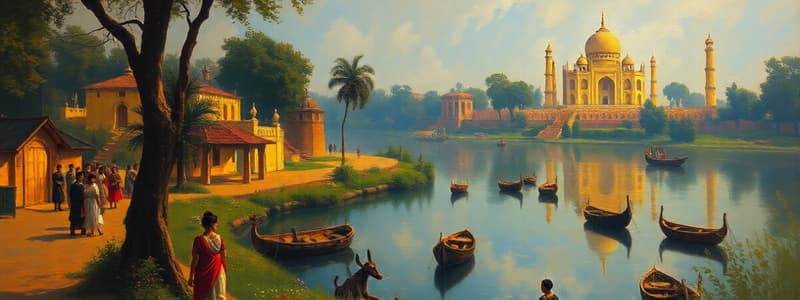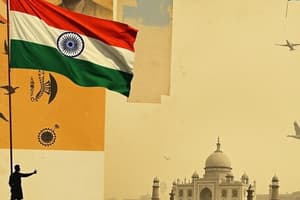Podcast
Questions and Answers
आज़ादी के बाद भारत ने किस प्रणाली को अपनाया?
आज़ादी के बाद भारत ने किस प्रणाली को अपनाया?
- लोकतांत्रिक गणतंत्र (correct)
- संविधानिक राजतंत्र
- एकदलीय राज्य
- साम्यवादी व्यवस्था
भारतीय स्वतंत्रता आंदोलन में किन नेताओं की भूमिका महत्वपूर्ण थी?
भारतीय स्वतंत्रता आंदोलन में किन नेताओं की भूमिका महत्वपूर्ण थी?
- सुभाष चंद्र बोस
- महात्मा गांधी
- वल्लभभाई पटेल
- जवाहरलाल नेहरू (correct)
ब्रिटिश उपनिवेशवाद का भारत पर क्या दीर्घकालिक प्रभाव पड़ा?
ब्रिटिश उपनिवेशवाद का भारत पर क्या दीर्घकालिक प्रभाव पड़ा?
- औद्योगिक विकास में वृद्धि
- स्वतंत्रता का उदय
- शिक्षा का विकास
- सामाजिक असमानता की वृद्धि (correct)
स्वतंत्रता के बाद भारत में किस सामाजिक मुद्दे पर ध्यान केंद्रित किया गया?
स्वतंत्रता के बाद भारत में किस सामाजिक मुद्दे पर ध्यान केंद्रित किया गया?
भारतीय उपनिवेश युग में आर्थिक विकास पर कौन सा प्रभाव पड़ा?
भारतीय उपनिवेश युग में आर्थिक विकास पर कौन सा प्रभाव पड़ा?
भारत में भूमि सुधारों का मुख्य उद्देश्य क्या था?
भारत में भूमि सुधारों का मुख्य उद्देश्य क्या था?
स्वतंत्रता के बाद भारत में कौन सी राजनीतिक विचारधारा उभरी?
स्वतंत्रता के बाद भारत में कौन सी राजनीतिक विचारधारा उभरी?
उपनिवेश काल में भारतीय रेलवे का क्या उद्देश्य था?
उपनिवेश काल में भारतीय रेलवे का क्या उद्देश्य था?
स्वतंत्रता के बाद भारत के औद्योगिक विकास को बाधित करने का एक प्रमुख कारण क्या था?
स्वतंत्रता के बाद भारत के औद्योगिक विकास को बाधित करने का एक प्रमुख कारण क्या था?
भारत में राष्ट्रीयता की वृद्धि के लिए कौन सा प्रमुख संगठन था?
भारत में राष्ट्रीयता की वृद्धि के लिए कौन सा प्रमुख संगठन था?
सिपाही विद्रोह (1857) का मुख्य कारण क्या था?
सिपाही विद्रोह (1857) का मुख्य कारण क्या था?
गाँधी जी ने किस आंदोलन के तहत जन सहभागिता को बढ़ावा दिया?
गाँधी जी ने किस आंदोलन के तहत जन सहभागिता को बढ़ावा दिया?
भारत का विभाजन किस वर्ष हुआ?
भारत का विभाजन किस वर्ष हुआ?
बैटल ऑफ प्लासी वर्ष 1757 में हुई थी, इसका मुख्य परिणाम क्या था?
बैटल ऑफ प्लासी वर्ष 1757 में हुई थी, इसका मुख्य परिणाम क्या था?
कौन सा आंदोलन महात्मा गांधी द्वारा नेतृत्व किया गया था?
कौन सा आंदोलन महात्मा गांधी द्वारा नेतृत्व किया गया था?
किस युद्ध ने भारत की स्वतंत्रता की मांग को तेज किया?
किस युद्ध ने भारत की स्वतंत्रता की मांग को तेज किया?
भारत में प्रशासन प्रणाली का निर्माण किसने किया?
भारत में प्रशासन प्रणाली का निर्माण किसने किया?
बंगाल का विभाजन भारत में किस वर्ष हुआ?
बंगाल का विभाजन भारत में किस वर्ष हुआ?
Flashcards
भारत की स्वतंत्रता के बाद की चुनौतियाँ
भारत की स्वतंत्रता के बाद की चुनौतियाँ
भारत की स्वतंत्रता के बाद के वर्षों में भारत को विभाजन से हुई व्यापक प्रवास और हिंसा जैसी चुनौतियों का सामना करना पड़ा।
भारतीय शासन प्रणाली
भारतीय शासन प्रणाली
भारत ने एक लोकतांत्रिक गणराज्य प्रणाली अपनाई और आर्थिक विकास पर ध्यान केंद्रित किया।
स्वतंत्रता के बाद भारत के लक्ष्य
स्वतंत्रता के बाद भारत के लक्ष्य
भारत ने एक मजबूत औद्योगिक आधार स्थापित करने, बुनियादी ढाँचे को विकसित करने और गरीबी, निरक्षरता और असमानता जैसे सामाजिक मुद्दों का समाधान करने का प्रयास किया।
ब्रिटिश उपनिवेशवाद का प्रभाव
ब्रिटिश उपनिवेशवाद का प्रभाव
Signup and view all the flashcards
भारतीय राष्ट्रवाद का उदय
भारतीय राष्ट्रवाद का उदय
Signup and view all the flashcards
भारतीय नेताओं और आंदोलनों की भूमिका
भारतीय नेताओं और आंदोलनों की भूमिका
Signup and view all the flashcards
स्वतंत्रता के बाद भारत की उपलब्धियाँ और चुनौतियाँ
स्वतंत्रता के बाद भारत की उपलब्धियाँ और चुनौतियाँ
Signup and view all the flashcards
ब्रिटिश शासन की आर्थिक नीतियाँ
ब्रिटिश शासन की आर्थिक नीतियाँ
Signup and view all the flashcards
ब्रिटिश शासन की संसाधन नीतियाँ
ब्रिटिश शासन की संसाधन नीतियाँ
Signup and view all the flashcards
ब्रिटिश साम्राज्य का विस्तार
ब्रिटिश साम्राज्य का विस्तार
Signup and view all the flashcards
ब्रिटिश विस्तार के कारक
ब्रिटिश विस्तार के कारक
Signup and view all the flashcards
प्लासी और बक्सर की लड़ाइयाँ
प्लासी और बक्सर की लड़ाइयाँ
Signup and view all the flashcards
ब्रिटिश प्रशासन का प्रभाव
ब्रिटिश प्रशासन का प्रभाव
Signup and view all the flashcards
1857 का सिपाही विद्रोह
1857 का सिपाही विद्रोह
Signup and view all the flashcards
भारतीय राष्ट्रीय कांग्रेस (INC)
भारतीय राष्ट्रीय कांग्रेस (INC)
Signup and view all the flashcards
स्वतंत्रता की मांग
स्वतंत्रता की मांग
Signup and view all the flashcards
राष्ट्रवादी नेता
राष्ट्रवादी नेता
Signup and view all the flashcards
गांधी के नेतृत्व में आंदोलन
गांधी के नेतृत्व में आंदोलन
Signup and view all the flashcards
Study Notes
Modern India's History - Overview
- Modern India, spanning from the late 18th century to the present, saw pivotal transformations, marked by colonial rule, independence movements, and nation-building efforts.
Colonial Period
- The British East India Company's gradual expansion, commencing in the 17th century, resulted in political and economic control over vast territories.
- The weakening of Mughal power, internal conflicts, and the company's growing military strength facilitated this expansion.
- Key events such as the Battle of Plassey (1757) and the Battle of Buxar (1764) consolidated British dominance.
- The British established a complex administrative structure, promoted English education, and implemented new economic policies that significantly influenced Indian society and the economy.
- The Sepoy Mutiny (1857), a major uprising against British rule, exposed the grievances of Indian soldiers and civilians. Despite its failure, this uprising was a pivotal moment in the struggle for independence.
- This era witnessed the rise of Indian nationalism and the emergence of various reform movements.
Rise of Nationalism
- The Indian National Congress (INC), established in 1885, played a critical role in advocating for greater Indian representation and self-rule, initially seeking greater autonomy within the British Empire.
- Gradually, the movement shifted towards the demand for complete independence.
- The partition of Bengal (1905) further fuelled the nationalist movement.
- Diverse ideologies and prominent leaders like Mahatma Gandhi, Jawaharlal Nehru, and Subhas Chandra Bose emerged, each employing distinct approaches towards achieving independence.
- The Non-Cooperation Movement, Civil Disobedience Movement, and Quit India Movement, led by Mahatma Gandhi, mobilized mass participation through non-violent resistance to secure freedom.
World Wars and Independence
- World War I and II significantly impacted India's struggle for freedom; British promises of self-governance remained unfulfilled.
- Growing international pressures and a changing global political landscape fueled the increasing demand for independence.
- The key events of the 1940s, leading up to India's independence on August 15, 1947, were intertwined with the complex partition of India and Pakistan.
Post-Independence India
- Independence was accompanied by significant challenges, primarily the large-scale migration and violence related to the partition.
- India adopted a democratic republic system of governance and focused on economic development.
- The nation embarked on establishing a strong industrial base, developing infrastructure, and addressing social challenges such as poverty, illiteracy, and inequality.
- Early leaders like Nehru played a pivotal role in shaping India's post-colonial trajectory.
Key Themes
- The impact of British colonialism and its enduring legacy on Indian society and economy.
- The growth of Indian nationalism and the independence movement.
- The crucial role of leaders and movements in shaping the nation.
- The challenges and progress of India in the post-independence era, including its democratic practices, economic policies, and social development.
Socio-economic Changes During Colonial Rule
- Extensive land reforms and alterations within the agricultural sector were implemented.
- The establishment of a centralized administrative structure, while aiming for efficient governance, sometimes stifled local initiatives.
- The development of an interconnected rail and communication network, although primarily serving imperial interests, also facilitated trade and communication across regions.
- The establishment of universities and educational institutions resulted in the expansion of a new educated middle class.
Economic Developments
- British policies hindered India's industrial growth, often favouring British industries.
- The colonial system primarily focused on extracting resources (like spices, cotton, and minerals) and providing raw materials for British industries.
Political Developments
- The emergence of regional parties and political ideologies contributed to the formation of a pluralistic political landscape, though often faced challenges in balancing unity and diversity.
Studying That Suits You
Use AI to generate personalized quizzes and flashcards to suit your learning preferences.




